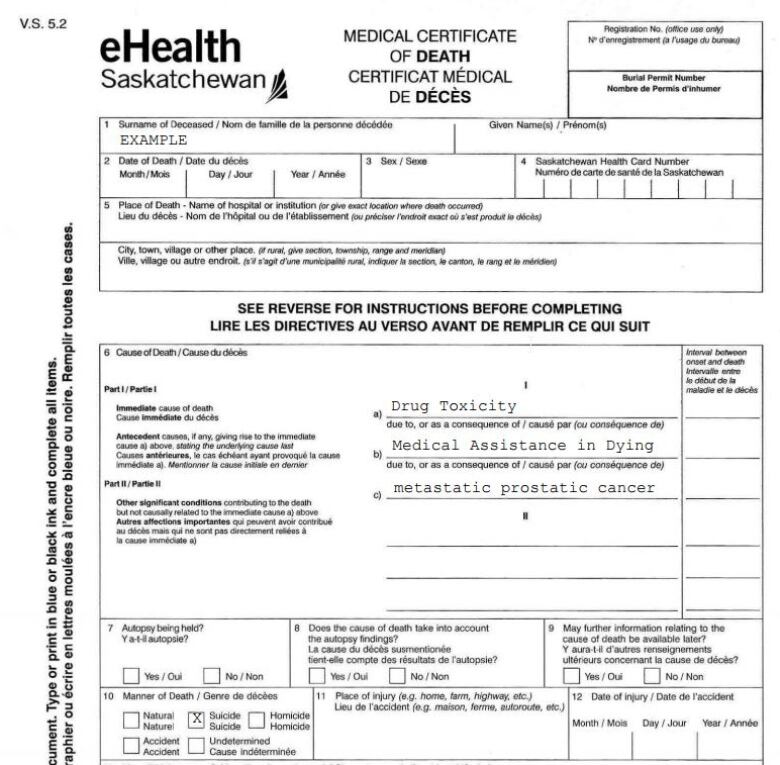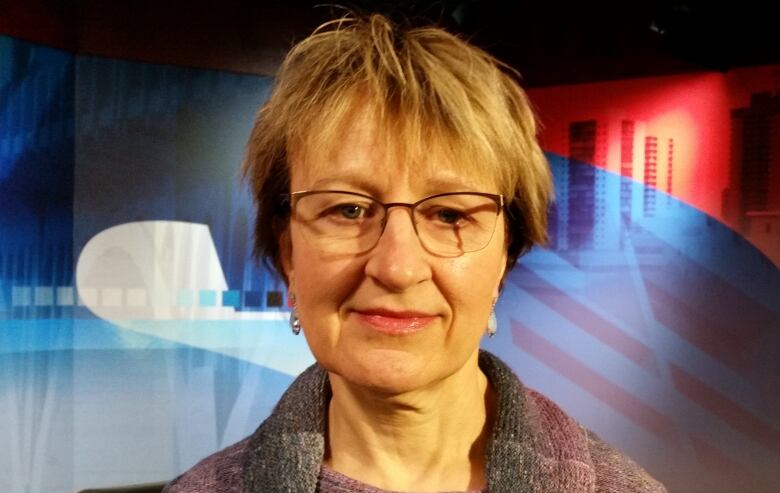Sask. ends practice of recording medically assisted deaths as suicides
Medically assisted deaths of terminally ill patients will now be marked as 'unclassified'

The Saskatchewan government has changed its practice of recording medically assisted deaths as suicides.
The deaths of terminally ill patients who ask for medical assistance to avoid a painful end to their lives will now be recorded as "unclassified." The change came into effect on Sept. 14, 2018.
A total of 123 medically assisteddeaths were recorded as suicides in Saskatchewan before the change was made.
Susan Tataryn, who spoke out against the policy after her mom Alice's death was recorded as a suicide, said the change is a step in the right direction.
"My mother died because she was full of cancer. I think it's a bit of a cop-out to say that it's unclassified. That suggests that you don't know why someone died," said Tataryn.
"It's better, it is absolutely better. Calling it unclassified is progress but it's only halfway there."
Certificates can be changed retroactively
The change was made through an amendment to Section 14 of the Vital Statistics (Medical Certificate of Death) Amendment Regulations. It applies to a person's medical certificate of death, not their death certificate.
Family members will also now be able to change the manner of death recorded on the certificates retroactively.
They will not be changed automatically.
Tataryn learned of the change about five weeks before the first anniversary of her mother's death. Pursuing changes to the law was one of the last things she talked about with her mom on the day she passed away.

She said changing the way the deaths are recorded to "natural" would have been more accurate and appropriate.
But Tataryn's family will still take the opportunity to remove "suicide" as the manner of death recorded on her mom's certificate.
"It certainly would be something that my family would celebrate when we get together in November," she said.
She said neither she nor her family members had been notified of the change, despite having contacted multiple MLAs and written to the Office of the Chief Coroner about changing the policy.
The Saskatchewan Coroners Service said in an emailed statement it is sensitive to the concerns of families.
"The coroners service is satisfied that these changes more accurately classify medical assistance in dying deaths and respond to the concerns raised by families," it said.
Doctor welcomes new policy
Dr. Lilian Thorpe is a member of the medically assisted dying team for the Saskatchewan Health Authority in Saskatoon, and a faculty member at the University of Saskatchewan College of Medicine.
Thorpe also works in the health region's geriatric program and has done more than 80 assessments for people who have applied for a medically assisted death.
"The term suicide is really, really upsetting to them and us because it is not what they wanted what they ever would have wanted," said Dr. Thorpe.

"For those who are very involved in faith communities it's particularly difficult. It's not what medical assistance in dying is for, it's not for the usual concept of suicide so we're very, very happy about this."
She said the use of the word "suicide" on the medical certificate of death was one of the biggest concerns raised by patients and families in two audits of the medical assistance in dying program in Saskatchewan. Those audits were completed by medical students.
Dr. Thorpe said she was aware the change was coming but was not notified when it happened.
She had also hoped the province would follow the lead of some others by listing the manner of death according to the underlying illness.
But she thinks the new classification will make a difficult process easier for families.
"That was our wish but this is better than what we had," said Dr. Thorpe.
Change could reduce stigma
She added that removing the word "suicide" from the medical certificate of death could make it easier for families to claim life insurance.
In some cases, insurance companies do not pay the expectedlife insurance when a person's death is marked as a suicide.
Changing the classification could also help reduce stigma surrounding medical assistance in dying, she said.
The Ministry of Health said families of people who died with medical assistance should contact eHealth if they want to remove the suicide classification from the medical death certificate of a loved one.












_(720p).jpg)


 OFFICIAL HD MUSIC VIDEO.jpg)
.jpg)



























































































